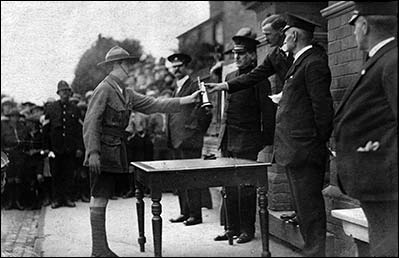|
The Rushden Echo, 28th August 1914, transcribed by Gill Hollis.
Rushden and District War Items
Boy Scouts on Guard - German Spy
We are officially informed that a man representing himself as a Scoutmaster, height 5ft 10½in., slight build, fair complexion, clean shaven, with a scar under his right eye, speaks with a German accent, has been seen selling pills and liquor to soldiers on duty. He is a very dangerous character, and is fully armed. During the last three days it is reported that he has been seen in the Rushden district. Should a man answering to this description be seen by any of our readers, he should be at once detained or information given to the nearest police officer.
Rushden Boy Scouts
The Rushden Boy Scouts are rendering useful service by watching the Bedford-road each night between the Wymington turn and Souldrop, guarding the telegraph wires, etc. A tent has been pitched in a field of Mr. F. Whittemore’s Bencroft Farm, and six Scouts are on duty each night, under the command of Scoutmaster F. E. Preston. The period of watching is from 10 p.m. to 4 a.m., and the boys work in couples in turns of two hours each, sleeping in the tent the remainder of the time. Each night a fresh lot of Scouts are on duty. Former members of the Rushden Troop willing to render assistance are invited to report themselves at headquarters.
|
Based on an article in "Scouting in Rushden 1909-1982, with kind permission.
|
Scout Messenger Service
 |
Ted Matthews was 19 years old when he received a bugle on behalf of the 1st Rushden Scout Troop in 1920. It was presented by the members of the Special Police, in appreciation of the Scouts' assistance given during 1914-1918, at Rushden Police Station.
Postcard by Edgar Linnitt, kindly loaned by Jim Matthews
|
|
|
|
| During WWI the Scout troops across the country helped their local community by delivering messages. Here in Rushden the troop, together with boys from the Church Lads Brigade, helped by manning the telephone at the Police Station between 7pm and 10.30pm each evening. If a report was received that enemy aircraft were within 70 miles, then the boys would run a message to a Special Police Constable. Older boys were detailed to guard railway bridges and tracks, or were on fire watch.
No official recognition for the work was made, so in 1920 the Specials at Rushden made their own presentation, in July 1920, in appreciation for how they had helped them during those years. Jim Matthews tells us that his father Ted, received the presentation bugle in a ceremony from the steps of the old Police Station.
Mr. Frederick Ernest Preston came to Rushden in 1906 to work as an architect. He designed the Independent Wesleyan Church and the Windmill Hall, as well as many other fine buildings in Rushden. In 1908 he took up Baden Powell's inspiration, and was involved with formation of the 1st Rushden Scout Troop in 1909. He was Scoutmaster until 1916 when he joined up.
On his return from the war, "Feppy" as he was affectionately known, drew up a Roll of Honour for the 122 scouts who had served, and to the memory of the 26 who had been killed during that conflict. He was appointed District Commissioner and for his dedication to the scouting movement he was awarded a Medal of Merit in 1934.
|
|
Rushden Echo, 10th November 1916, transcribed by Kay Collins
Boy Scouts—A number of Rushden scouts were on Sunday afternoon presented with war service badges by Mr. A. H. Sartoris, their president, at a scouts’ parade at Rushden Hall, the recipients of the red and gold badges being: For 100 days, C. Cox (scoutmaster), R. Sugars, G. Fountain, J. Bates, E. Higgins, F. Eyres, W. Burditt, and F. Sharp: for 28 days, F. Sugars, J. Webb, A. Lilley, F. Hester, S. Robinson, and R. Tew.
|
Rushden Echo, 2nd February 1917, transcribed by Kay Collins
Scouts—Assistant Scoutmaster R. Sugars, of the 1st Troop, Rushden Boy Scouts, has resigned after .. years’ service, owing to joining the Colours.
|
|
Rushden Echo, 26th October, 1917, transcribed by Gill Hollis
Over twelve bushels of chestnuts have been collected by the Rushden Boy Scouts in the grounds of Rushden Hall, at the invitation of Mrs. Sartoris. Secretary C. Cox, Scoutmaster Fountain, and Assist. S. M. Parkin were in charge of the boys. The chestnuts are required for munition purposes.
|
Rushden Echo, September 20th, 1918, transcribed by Greville Watson
Rushden’s Casualty List - A.B. William Burditt, R.N.D., son of Mr. and Mrs. Samuel Burditt, of High-street South, Rushden, was severely wounded in the right leg on September 2nd. Before joining the Colours Seaman Burditt, who is 19 years of age, worked for Messrs. W. Sargent and Co., Crabb-street. For five years he was a member of the 1st Rushden Troop of Boy Scouts, and he was one of those who guarded the telegraph lines on the Bedford-road after the outbreak of war. Mr. and Mrs. Burditt have one other son who is a prisoner of war, and a younger son joined the Colours a week or two ago on reaching the age of 18.
|
Scout's Roll of Honour
|